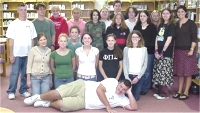| Verbal |
- Examine the role of propoganda in political advertising
- Develop information literacy skills for considering messages delivered across varied media
- Report weekly data to the project web site
|
| Logical |
- Analyze trends in polling data locally and/or across your home state
- Utilize critical thinking skills to challenge claims made by candidates
- Employ higher level questioning techniques in classroom debates
|
| Visual |
- Analyze political cartoons for editorial content
- Graph data in chart and table formats
- Color code collected data to correspond with candidates or parties
|
| Kinesthetic |
- Create pins, buttons, posters, banners and other kinds of campaign paraphanlia
- Conduct polls and surveys in public areas of your school or community
- Hold a Cyberconvention campaign rally in your classroom
|
| Musical |
- Find patterns in election data
- Identify trends in news stories across your home state
- Project winners based on patterns and trends
|
| Intrapersonal |
- Allow students to support candidates of their choosing
- Research issues which are meaningful and significant to students
- Write persuasive letters on pertinent issues to local, statewide and/or Web-based media
|
| Interpersonal |
- Work cooperatively in studying political issues and races
- Interact with local elected officials and members of the media
- Participate in the National Cyberconvention online the Week of October 26th
|
| Naturalist |
- Sort collected data based on agreed upon criteria
- Categorize candidates based on their stands on issues
- Describe the organization of political parties, political conventions and the electoral college
|
| Existential |
- Study the history and traditions of major political parties
- Examine campiagn issues from multiple points of view
- Explore the needs and expectations for your community and state over the next four years
|


